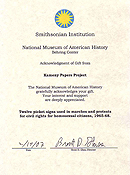The Kameny Papers Project received this certificate from the Smithsonian Institution:

Click the above image to see a full-size pdf version of this "Acknowledgement of Gift".

Provenance:
The source of the KamenyPapers is Frank Kameny himself; these papers come from a lifetime collection, which has remained in the attic of his residence.
Dr. Kameny is the sole owner of the archive; he has personally authorized this effort to preserve and donate his papers. We are his agents to accomplish this effort, and will receive no payment or commission, beyond approved expenses. |
|
|
1960s Letter to Mattachine Society of Washington, D.C. from Civil Service Commission Entered into Evidence, Perry v Schwarznegger
Contact: Charles Francis
Kameny Papers Project
ccfrancis@aol.com
A 1966 letter to The Mattachine Society of Washington, D.C. from then Chairman of the U.S. Civil Service Commission John W. Macy, Jr was entered into evidence, January 25, 2010 in Perry v Schwarznegger. The letter is now part of the Kameny Archive at the Library of Congress in Washington, D.C.
The letter to Mattachine is a four-page justification for the ban on homosexual employment by the Federal government.
The relevance of John W. Macy’s letter to Perry is twofold. First, the letter is an example of the animus of the federal government; Macy cites “the revulsion of other employees” when they work with an “admitted sexual deviate”. It is also shows the Federal government refusing to define a homosexual as a person or identity, but only a conduct for which he or she will be fired. “We see no third sex, no oppressed minority or secret society..”,Chairman Macy—who had served under Presidents Eisenhower,Kennedy and Johnson--writes with some sarcasm.
In the letter, Macy writes Mattachine: “We do not subscribe to the view, which indeed is the rock upon which the Mattachine Society is founded, that “homosexual” is a proper metonym for an individual. Rather we consider the term “homosexual” to be properly used as an adjective to describe the nature of overt sexual relations or conduct.”
This letter from Macy to The Mattachine Society of Washington, D.C. stood as Commission policy that homosexuals were “unsuitable” for Federal Employment until July 3, 1975. At a press conference on this date, the Civil Service Commission announced it was dropping “immoral conduct” and “notoriously disgraceful conduct”, and homosexuality as a sole basis for disqualification.
Forty-three years later, in 2009, the successor of the U.S. Civil Service Commission, the Office of Personnel Management (OPM) formally repudiated and apologized for this policy to Franklin E. Kameny, then President of The Mattachine Society of Washington, D.C., who was fired in 1957.
Two documents from the Kameny Archive at the Library of Congress were entered into evidence in Perry v Schwarzenegger, January 25, 2010. The other document is a 1974 letter from the IRS declining to certify the Pride Foundation of San Francisco as “charitable” because the Foundation had a gay-related educational mission.
* * *
MR. DUSSEAULT: Your Honor, the next two documents
17 that we'd seek to move into evidence are 2566 and 2581. If we
18 could just start with -- let me start with 2581, Your Honor.
19 And, Your Honor, these are documents that we obtained
20 from a website called the "kamenypapers." But each of the
21 underlying documents can be found in the Library of Congress,
22 and is admissible evidence under the ancient records exception.
23 And this first one is a communication to the Pride
24 Foundation, in which the Treasury is denying an application for
25 tax exempt status for a group that seeks to further the rights
of gay and lesbian people.
2 And we would submit, Your Honor, that this document
3 is admissible and is relevant to the issues of the history of
4 discrimination that gay and lesbian people have faced, and also
5 to the question of relative political power.
6 THE COURT: This is a document from 1974?
7 MR. DUSSEAULT: That's true.
8 THE COURT: And you're characterizing this as an
9 ancient document?
10 (Laughter)
11 MR. DUSSEAULT: Don't shoot the messenger, Your
12 Honor. I think it's the rules of evidence that say 20 years or
13 more.
THE COURT: Very well. Ms. Moss.
16 MS. MOSS: Your Honor, the hearsay objection aside,
17 the source of these, as he noted, is a website. It may be that
18 these are obtainable from the Library of Congress. I don't
19 know.
20 What they have given us is something that's a
21 printout from a website. There is no way to verify. I don't
22 know this website.
23 They haven't put anybody up there to explain where
24 the -- the individual who controls this website obtained these
25 documents. So there's no way to know that they are in fact
authentic copies of what would be in the Library of Congress.
2 And, for that reason, we would object that the authenticity has
3 not been established.
4 THE COURT: Would the Library of Congress maintain a
5 document such as this?
6 MR. DUSSEAULT: Apparently so, your Honor.
7 And to be clear, the underlying document, we are not
8 suggesting that the website page, which is intended to show
9 where we got it, is in the Library of Congress.
10 THE COURT: Well, you did not obtain the IRS letter
11 from the Library of Congress.
12 MR. DUSSEAULT: Your Honor, Mr. Olson is reminding me
13 that we did actually, anticipating this concern, go and make
14 sure that we could obtain it from the Library of Congress; that
sure that we could obtain it from the Library of Congress; that
15 this document can be obtained from the Library of Congress.
16 The copy that we had included on our exhibit list was
17 one that we obtained from the website, but we have researched
18 this.
19 And perhaps what we could do, your Honor, is admit it
20 into evidence subject to a qualification --
21 THE COURT: Well, I will accept counsel's
22 representation and on that basis, it probably would be well to
23 verify that. But what lawyers say in making factual
24 representations to the Court, the Court assumes the accuracy of
25 those statements and holds lawyers accountable.
So based upon your representation that this is
2 available from the Library of Congress, the letter dated
3 October 8, 1974 to the Pride Foundation of San Francisco from
4 the Internal Revenue Service will be admitted. So that portion
5 of 2581 one will be admitted.
6 MR. DUSSEAULT: Thank you.
7 (Plaintiffs' Exhibit 2581, 10/8/1974 letter received
8 in evidence.)
9 MR. DUSSEAULT: And then if we could publish the
10 letter and on the page numbered beginning "Based on the
11 foregoing."
12 (Document displayed)
13 MR. DUSSEAULT: What I would read at this point, your
MR. DUSSEAULT: What I would read at this point, your
14 Honor, is from the letter denying tax exempt status to the
15 Pride Foundation. It says:
16 "Based on the foregoing, we feel that your
17 activities are advancing the unqualified and
18 unrestricted promotion of the alleged
19 normalcy of homosexuality. Thus, we conclude
20 that your activities carry a serious risk of
21 contributing to a more widespread development
22 of homosexual tendencies among certain
23 segments of the public and a consequent
24 increase in the general prevalence of what is
25 still generally regarded as deviant sexual behavior. As such, your activities are
2 contrary to public policy and are, therefore,
3 not charitable."
4 And the second document, your Honor, is Exhibit 2566,
5 your Honor.
6 And Exhibit 2566, your Honor, is also from the same
7 website and we can also represent that it's obtainable from the
8 Library of Congress. And I apologize for the quality of the
9 print, especially on the first page.
10 But what this document is, it's from the United
11 States Civil Service Commission and it is a document written in
12 1966 explaining the government's policy against having gay and
13 lesbian individuals employed in Civil Service.
14 And we would move the document into evidence under
the same terms and reasoning as the prior document.
16 THE COURT: Well, based on your representation that
17 this is document to be found in the archives of the Library of
18 Congress and is, therefore, an official government record, 2566
19 will be admitted.
20 (Plaintiffs' Exhibit 2566 received in evidence.)
21 MR. DUSSEAULT: Thank you, your Honor.
22 Now, your Honor, the final group of documents that I
23 have to address is a larger number --
24 THE COURT: Is there any particular portion of the
25 United States Civil Service Commission letter dated
February 25, 1966 that you wish to draw the Court's attention
2 to?
3 MR. DUSSEAULT: Yes, your Honor. Give me one moment.
4 THE COURT: And what is being admitted in 2566, as
5 with 2581, is simply the government letter, rather than the
6 Kameny papers portion of the documents or portions of the
7 exhibit.
8 MR. DUSSEAULT: Yes, your Honor.
9 Your Honor, on -- and, again, I apologize for the
10 quality of the copy. On page two of the exhibit, of particular
11 note is where, in explaining the policy, the author talks
12 about:
13 "Considerations that encompass the types of
14 deviant sexual behavior engaged in whether
15 isolated, intermittent or continuing acts.
16 The age of the particular participants, the
17 extent of promiscuity, the aggressive and
18 persistent character of the individual's
19 participation" --
20 THE COURT: Keep your voice up.
21 MR. DUSSEAULT: Thank you. Sorry. I'm looking very
22 closely at the page.
23 "...the recency of the incidents."
24 And then it goes on here, your Honor.
25 But what I think is particularly noteworthy in this
document is it essentially justifies the policy by denying the
2 concept of a homosexual as a person or individual and, rather,
3 focuses on the conduct as a justification and says because this
4 is talking about conduct, it's a sufficient basis to exclude
5 people from working for the government.
6 THE COURT: Very well.
|
|


